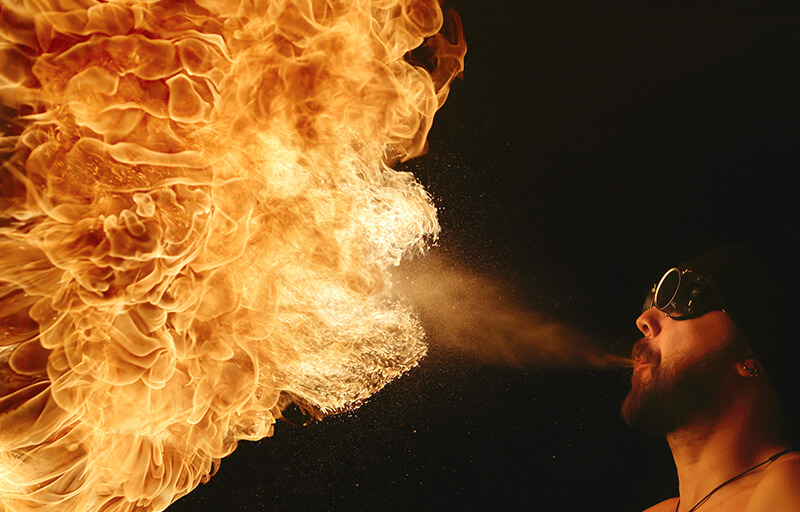If you’ve ever eaten a superhot chili pepper, you remember those unpleasant/interesting moments when you thought your tongue had burst into flames and nothing – milk, water, beer – could quench the burn. Now imagine having to live with that sensation for months, even years.
People who suffer from Burning Mouth Syndrome (BMS) experience frequent – sometimes constant – scalding sensation on their gums, tongue, lips, roof of the mouth, inside cheeks, and the back of their mouth and throat. They also may have dry mouth and lips, stinging or numbness in the mouths or the tip of their tongues, plus a bitter or metallic taste at the back of the throat. Symptoms tend to peak in the evening. The pain may be accompanied by frequent headaches or migraines.
If your mouth feels like you just rinsed it with boiling hot water – you may have BMS. About 2% of Americans do suffer from BMS. It is most common in middle-aged and older people, and is seven times more likely to affect women than men.
What Causes Burning Mouth?
There is no single medical disorder or physical problem that causes the syndrome, it is associated with problems ranging from nutritional problems to diabetes and migraines.
Some of the health issues that have been connected to BMS include:
Acid Reflux: this condition can damage oral tissues, resulting in the burn and irritation associated with BMS.
Dental problems: poorly fitting dentures or bridges, oral infections, gun disease and tooth decay can all cause sensations of burning in your mouth. See your dentist for help in diagnosing and treatment options.
Diabetes: the oral infections and vascular changes associated with diabetes may result in BMS. Speak with your healthcare professional to see how you can better manage your blood sugar levels, this may also help alleviate BMS.
Dry mouth: caused by an assortment of medical conditions, and temporary issues such as dental treatment, smoking cessation, etc. People have reported relief by staying well-hydrated, using artificial saliva or other dry mouth treatments. Ask your dentist for suggestions
Menopause: hormonal changes are a frequent cause of BMS, though hormone replacement therapy hasn’t been consistently successful in treating the problem.
Migraines: new research indicates that migraines and BMS may share a similar trigger, a protein that dilates blood vessels. Speak with your doctor and/or dentist about treatment options.
Nutritional deficiencies: typically iron, zinc and vitamin B, doctors have prescribed supplements to alleviate BMS
Oral fungal infection: if your BMS symptoms are especially severe after eating acidic foods or citrus drinks, and you notice white spots in your mouth, you may have a fungal infection. Get a checkup and have your dentist prescribe a treatment plan.
Stress, especially if you grind your teeth or have stomach problems, can make BMS symptoms more severe. Dental problems, acid reflux disease, allergies to oral care products, cancer therapies, and some medications can also cause BMS.
Fire Fighting Tips
Discuss your symptoms with your dentist, who may refer you to another healthcare professional. If you are seeing a physician or other practitioner for a disease linked to BMS, you may want to talk with them first. Don’t attempt to self-diagnose or treat BMS on your own (which includes deciding that you have BMS because your symptoms perfectly match the ones outlined in this article).
Your dentist or doctor may run tests to check for infections, nutritional problems, medical conditions such as diabetes, thyroid functioning, and allergies.
If there is no condition present that can be linked to BMS, your dentist/doctor may choose to treat the symptoms to make you more comfortable.
Some treatments for BMS include:
- Medication for infections, pain, allergies
- Switch to super-gentle oral care products, no mouthwash with alcohol, no sodium lauryl sulfate in toothpaste
- Avoid alcoholic and high acidity beverages (fruit juice, coffee, soda)
- Stop smoking
- Sip ice water frequently, and suck on ice chips, but don’t chew the ice.
If you’ve been putting off speaking with a dentist about BMS due to cost, we can help. Find out more about dental savings plans, the affordable alternative to insurance, at DentalPlans.com or by calling our :DP AtYourService Customer Care Representatives at 1-800-238-5163.
